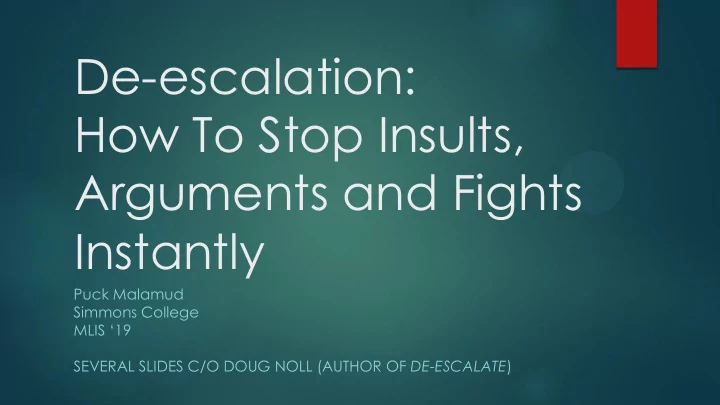

De-escalation: How To Stop Insults, Arguments and Fights Instantly Puck Malamud Simmons College MLIS „19 SEVERAL SLIDES C/O DOUG NOLL (AUTHOR OF DE-ESCALATE )
Welcome / Objectives ▶ If, like me, you are confrontation- averse or frightened by displays of anger, this‟ll help ▶ 3 skills that work together to de- escalate a tense situation Ignore the words ▶ Identify/guess at the emotions ▶ Affect labeling - Reflect the emotions with direct, ▶ declarative statements
Who am I? ▶ Puck Malamud ▶ MLIS '19 (hopefully :D) @ Simmons College ▶ Just another aspiring librarian ▶ I read De-escalate and found the insights valuable and thought I'd share them with you
Who Is Doug Noll? ▶ Started out as a lawyer, then became a mediator ▶ Masters Degree in Peacemaking and Conflict Studies ▶ Co-Founder, Prison of Peace ▶ Authored De-Escalate and teaches webinars on the same skills
Prison of Peace Program Founded in March 2010 by Laurel Kaufer and Douglas Noll by ▶ the request of Susan Russo, an inmate at Valley State Prison for Women (VSPW) in Chowchilla, California. Participants resolve conflicts, act as mediators, teach their ▶ skills to other inmates. Initial participants in each prison serving life or long-term ▶ sentences, with preference given to those serving sentences of life without parole. Participants can successfully change a culture of violence in ▶ their facility
How Would You Respond? ▶ What? You forgot the gift? I can‟t believe how stupid you are! ▶ Write down your response.
How Would You Respond? ▶ Would you stop doing that? It drives me crazy! ▶ Write down your response.
How Would You Respond? ▶ All you can do is think about yourself. You never think about my feelings! ▶ Write down your response.
What We'll Cover: ▶ Skill #1: How To Ignore Angry Words ▶ Skill #2: How To Guess At The Emotions ▶ Skill #3: How to Reflect Back The Emotions With A Simple "You" Statement
Skill #1: How To Ignore Angry Words
"I don't understand how ignoring the words with angry people will...” ▶ Help me remain calm ▶ Really work ▶ Calm the angry person down ▶ Make me more effective ▶ Create peace
Answer: ▶ Ignoring the words protects you from getting triggered ▶ We are fixated on words even when they are not important ▶ You don‟t need to listen to words—you‟ve heard it all before, right? ▶ You have to ignore the words to free up your brain‟s bandwidth for the next skill ▶ Despite ignoring the words, you will remember MORE of what was said than you can imagine
Skill #2: How To Guess At The Emotions
“Emotions are hard to read. I‟m not…” ▶ Able to guess at emotions ▶ Able to read emotions ▶ Able to pay attention to others' emotions ▶ Emotional myself ▶ Comfortable with other people‟s feelings
Answer: ▶ You have an innate ability to understand what another person is feeling ▶ You only have to guess at the emotions ▶ It doesn't matter if you are wrong ▶ There are really only a few emotions that you need to recognize
Nine Innate Affects Affect: innate, biological response to increasing, decreasing, or persistent intensity of neural firing. Feeling: awareness of an affect Emotion: a feeling plus memory of prior similar feelings. ❏ Distress-Anguish ❏ Fear-Terror ❏ Interest-Excitement ❏ Shame-Humiliation ❏ Enjoyment-Joy ❏ Disgust ❏ Surprise-Startle ❏ Dissmell ❏ Anger-Rage
Common Negative Emotions: Emotions Come in Layers 1. Anger, Rage, Frustration 2. Anxiety, Fear, Frightened, Scared 3. Unfair, Unsupported, Unheard 4. Shame, Humiliation, Embarrassment 5. Sadness, Grief 6. Abandoned, Alone, Unloved
Try it now:
Skill #3: Reflect Back The Emotion With A Simple "You" Statement
Some People Say... ▶ “Telling someone how they are feeling is rude and manipulative” ▶ “I don‟t know how to…” ▶ Reflect back feelings ▶ Be empathic ▶ Speak to someone‟s feelings, rather than their words
All It Takes Is A Simple “You” Statement ▶ “You are angry.” ▶ “You are frustrated” ▶ “You are pissed off.” ▶ “You are sad.”
How to do this ▶ Don‟t ask questions ▶ Don‟t use an “I” statement ▶ Keep it simple and direct ▶ Be informal, conversational ▶ Be authentic
Telltales You‟ve Suceeded ▶ Nod of the head ▶ Verbal response: “Yeah!” or “Exactly!” ▶ Dropping shoulders ▶ Sigh of relief
How Would You Respond Now? ▶ What? You forgot the gift? I can‟t believe how stupid you are? ▶ Write down your response.
How Would You Respond Now? ▶ Would you stop doing that? It drives me crazy? ▶ Write down your response.
How Would You Respond Now? ▶ All you can do is think about yourself. You never think about my feelings! ▶ Write down your response.
What We've Covered: ▶ Skill #1: How To Ignore The Angry Words ▶ Skill #2: How To Guess At The Emotions ▶ Skill #3: How Reflect Back The Emotion With A Simple "You" Statement
▶ Practice these skills with a trusted friend ▶ Then test them out in low risk social environments! ▶ Hopefully next time you encounter a livid patron or colleague, you‟ll have these ready in your back pocket.
Questions? Wanna practice during the unconference portion?
Recommend
More recommend